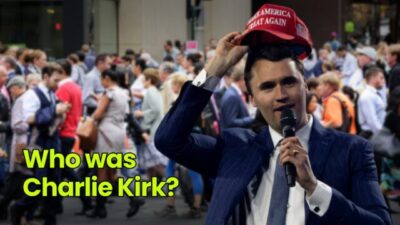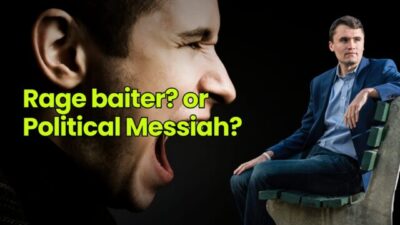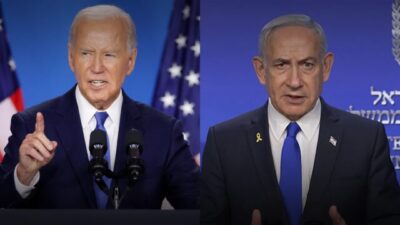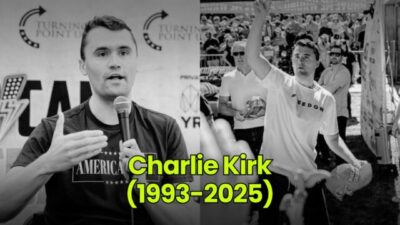Charlie Kirk Dead? Here’s What Actually Went Down
By Nathan Brookes
September 10, 2025 • Fact checked by Dumb Little Man
Alright, let me just stop you right there. If you’ve recently typed “Charlie Kirk dead” into your search bar, you’re definitely not alone, and no, your internet isn’t glitching. People are losing their collective minds over this, and for good reason. Because guess what? Unlike 99.9% of those clickbait “celebrity death” rumors, this one is real.
Yes, it’s true. Charlie Kirk, the highly controversial and always outspoken conservative firestarter, is dead at just 31 years old. Not dead in a “he just deleted Twitter” kind of way. Dead-dead. As in, gone. And if you’re feeling whiplash from how fast that news just hit you, same. We’re all shaken.
Now, I know what you’re thinking: what the hell happened? On Sept 10, 2025, Charlie Kirk was shot during an event at Utah Valley at Valley University in Orem, located in Orem, Utah. Was it some political conspiracy? A tragic accident? A scandal gone terribly wrong? Oh honey, it’s worse than anything the rumor mill could’ve cooked up. This is not your average “oops, he faked his death to go live on an island” kind of story. It’s a brutal, raw, and honestly heartbreaking situation that’s still unfolding.
So take a breath, maybe grab a snack, and let’s walk through the chaos together. Because what led up to this moment? It’s not just shocking—it’s absolutely wild. And I’m about to break it all down for you, step by step. No fluff, no sugarcoating, just the cold, hard, jaw-dropping truth. Buckle up.
Who Was Charlie Kirk? (Yep—We Gotta Talk Backstory)

Before we dive into the tragic mess, let’s get familiar with the man behind the headlines. Founder Charlie Kirk, known as both a conservative influencer and a driving force in the conservative movement, was more than just a conservative talking head. He was a full-blown political force, especially among Gen Z and millennial conservatives.
Born in 1993, Charlie skipped college and jumped headfirst into activism. At 18, he founded Turning Point USA—basically the political version of a college startup. Turning Point USA's rapid rise marked an organization turning point in conservative youth activism, becoming his baby, his brand, and his launchpad to influence.
Charlie Kirk's life was a journey that shaped conservative youth activism, inspiring countless young people to engage in politics and defend free speech.
He wasn’t shy. Oh no. Conservative commentator Charlie Kirk had takes hotter than a ghost pepper. He’d slam liberal policies, champion capitalism, and sprinkle in Bible quotes like seasoning. He was a regular guest on Fox News, ran a popular podcast, and packed auditoriums on his “American Comeback Tour.”
Whether you agreed with him or not, you couldn’t ignore him. His fans adored him. His critics couldn’t stand him. But everyone was watching. Because when Charlie spoke, the internet lit up.
Charlie Kirk’s Political Beliefs: Far-Right, Fired-Up, and Fully Committed to Turning Point USA
Let’s cut to the chase: Charlie Kirk’s political views were loud, proud, and unapologetically far-right. He wasn’t tiptoeing around anything—he came in swinging, and baby, he aimed to shake tables. Charlie Kirk's influence on conservative youth and political discourse was significant, as he mobilized a new generation through his leadership and outspoken advocacy.
- His love for capitalism? Obsessive. He believed big government was the enemy of freedom, and anything remotely “socialist” (like healthcare or student debt relief) sent him into a tailspin. Work harder, don’t expect handouts, and hustle ‘til you drop—that was his vibe.
- Abortion? Nope. He was as anti-choice as it gets, arguing that life begins at conception and branding abortion advocates as morally bankrupt. His messaging was aggressive and deeply tied to his belief in Christian conservatism.
- He also clung to the Second Amendment like it was the last cheeseburger on Earth.
- Gun control? In his words: tyranny. Kirk believed more guns equaled more safety. (Spoiler: not everyone agrees.)
- When it came to LGBTQ+ rights, he was vocally anti-trans, especially targeting schools, pronouns, and gender-affirming care. He treated DEI and critical race theory like they were straight from Satan’s syllabus.
- And climate change? He laughed it off as an overhyped excuse to kill oil jobs. In short: Kirk’s politics were aggressive, extreme, and designed to go viral. Subtlety? Never heard of her.
Charlie Kirk's death has sparked intense debate about the consequences of political polarization and the dangers of escalating political violence in America.
Viral Moments? Charlie Kirk LIVED for the Internet Spotlight

Oh honey, if controversy was currency, Charlie Kirk would’ve been a billionaire. The man lived for viral moments, and trust—he knew exactly what he was doing.
His college tours with Turning Point USA were less about debate and more like MAGA pep rallies on college campus after college campus. He’d barge into liberal campuses, throw anti-left zingers, and BOOM—clips went viral overnight. The conservative crowd loved it. The opposition? Not so much. Kirk often encouraged students to debate openly at these events, stressing the importance of free and honest discussion. As part of his ongoing tour, he’s set to host a “Prove Me Wrong” table event at Colorado State University.
Let’s not forget his internet-breaking hot takes. That anti-mask tweet during COVID? “Masks are muzzles for the masses.” People dragged him for days, but he soaked up the attention like it was sunscreen at Coachella.
Then came the 2020 election meltdown. Kirk jumped headfirst into voter fraud conspiracies, sharing “proof” that later got debunked harder than a flat-Earth theory. Platforms restricted him. He cried censorship. His fanbase? Ate it up.
He even trended on TikTok, but not for reasons he’d love. Gen Z made whole series clowning his speeches, debating his facts, and turning his soundbites into comedy gold. But guess what? Kirk didn’t care. Viral outrage was the game, and he played it like a pro.
Whether you saw him as a truth-teller or a walking dumpster fire, one thing’s for sure: Charlie Kirk knew how to stir the pot.
Public Perception: Icon or Instigator?

Charlie Kirk was the human version of a group chat fight. You were either quoting him or rage-tweeting about him—there was no in-between.
To his loyalists, he was a freedom-fighting genius. These folks hailed him as a modern patriot, fighting back against liberal “brainwashing” in schools, media, and government. They saw him as bold, unfiltered, and fearless—a guy who said what everyone else was “too scared” to say.
Following his death, the public expressed deep condolences to Charlie Kirk's family and the Kirk family, recognizing the profound grief faced by his loved ones. He is survived by his wife Erika and their two young children, and many tributes emphasized the impact of this tragedy on Kirk's family.
But to his critics? Whew. He was the poster boy for misinformation and performative outrage. Many labeled him a grifter, chasing clicks with bad takes and fearmongering headlines. He faced constant backlash for spreading false claims—especially about COVID, elections, and LGBTQ+ issues.
Even within conservative circles, he wasn’t always adored. Some old-school Republicans found him too extreme, more interested in clout than constructive conversation. And moderates? Please—they couldn’t roll their eyes hard enough.
Public perception boiled down to one word: polarizing. He wasn’t trying to unite America; he thrived in division. If people were yelling, he considered it a win.
Love him or loathe him, Charlie Kirk made sure you noticed him. And in today’s political circus, that kind of attention was his ultimate power play.
What Actually Happened at the Shooting at Utah Valley University?

Let’s talk facts. No clickbait. No drama. Just what went down on that chaotic day.
It happened on September 10th, 2025, during one of Kirk’s live events at a Utah college campus, specifically at Utah Valley University, a university in Orem Utah. He was mid-speech—talking about traditional values, the Constitution, all the usual Charlie stuff—when it happened.
Suddenly, a shot rang out.
People first thought it was an accident. Maybe fireworks? Maybe a mic pop? But nope. It was a bullet. Kirk was shot. And that bullet hit Charlie Kirk directly in the neck. Kirk's shooting was a targeted attack. Panic broke out. The auditorium became chaos. People ducked, screamed, ran. Security, including Utah Valley University police, rushed in. Emergency services were called within seconds.
The shooter? Unknown at the time. But reports later confirmed the shot came from a window 200 yards away, inside the Losee Center building, aimed with precision. The department of public safety and Utah Department officials quickly launched an investigation. A law enforcement official provided updates throughout the day, confirming the suspect was in custody. The FBI coordinated with their field office in Salt Lake City to assist in the investigation.
Kirk was rushed to the hospital. Surgery followed. But the injury was too severe. Despite everything, Kirk died later that evening as a result of Kirk's killing. The aftermath was widely reported as Charlie Kirk's murder, sparking national outrage and calls for unity.
His death was announced publicly by former President Donald Trump on Truth Social. Within hours, every major news outlet confirmed it. Charlie Kirk, a prominent conservative figure, was lost in this tragedy.
The Investigation: Sorting Fact from Fiction in Real Time
If you thought the chaos ended when the news broke, think again. The investigation into Charlie Kirk’s shooting at Utah Valley University has been a whirlwind—equal parts high-stakes drama and real-time detective work. Law enforcement officials, led by FBI Director Kash Patel, are working around the clock to separate fact from internet fiction, and trust, the rumors are flying faster than ever.
Here’s what we know: In the immediate aftermath, a person of interest was taken into custody, grilled by authorities, and then released when the evidence didn’t stick. Utah Governor Spencer Cox didn’t mince words, calling the attack a “political assassination” and vowing to bring whoever killed Charlie Kirk to justice. The message from the top? No stone will be left unturned.
President Donald Trump wasted no time, either. He ordered American flags lowered to half-staff in honor of the conservative activist and pointed the finger at what he called “radical left political violence.” That accusation set off a national firestorm, with everyone from cable news hosts to your uncle on Facebook debating whether political rhetoric is fueling real-world violence.
Meanwhile, the Utah Valley University campus turned into a crime scene. Classes were canceled, the campus was locked down, and students were escorted out by police. Law enforcement officials are combing through CCTV footage, and the FBI has set up a digital tip line, urging anyone with information to come forward. Witnesses say the shooter fired from a rooftop, dressed in dark clothing, and vanished before anyone could react. The hunt is on.
Turning Point USA, the conservative youth organization Kirk founded, released a statement asking for prayers for Kirk’s family and promising to keep fighting for free speech on college campuses. They’re not backing down, even as they mourn their founder.
READ ALSO: Obama Warns Democrats to Quit Playing Nice With Trump
How the Influencer's Death Affected Figures

The shockwaves from Kirk’s death have reached all corners of the political world. Former President Joe Biden condemned the violence, saying there’s no place for this in America. House Speaker Mike Johnson called the shooting a tragic reminder that we must reject political violence, no matter our differences. Vice President JD Vance and the Republican National Committee echoed those calls, urging Americans to come together and honor Kirk’s legacy by debating openly—not with bullets.
But the questions keep coming. Was Kirk targeted for his outspoken conservative views? Was this a random act, or something more sinister? Utah Governor Spencer Cox says the evidence points to a targeted attack, and the FBI is digging deep into whether Kirk’s political activism made him a marked man.
The tragedy has also sparked a fierce debate about security on college campuses. Critics are slamming Utah Valley University for not having tighter measures—no metal detectors, no bag checks, nothing to stop a shooter from getting close. The university has apologized and promised a full review, but for many, it’s too little, too late.
Globally, leaders are weighing in. Israeli Prime Minister Benjamin Netanyahu called Kirk a “lion-hearted friend of Israel.” UK Prime Minister Keir Starmer stressed the need for free speech and open debate. And everywhere, people are asking: How did we get here?
As the investigation continues, one thing is clear—America is at a crossroads. Law enforcement is urging vigilance, Turning Point USA is doubling down on its mission, and politicians on both sides are calling for a return to civility. The message? Reject political violence. Protect free speech. And never let tragedy silence debate.
The story isn’t over. But as the nation mourns Charlie Kirk, the call to reject hate and defend open discourse has never been louder.
Why the “Charlie Kirk Dead” Searches Skyrocketed Before the Truth Broke
Here’s the thing: people were already searching “Charlie Kirk dead” before the official news dropped. Why? Because chaos travels faster than facts.
Right after the shooting, blurry videos and frantic tweets started flying. Someone posted, “Charlie Kirk just got shot???” Another said, “Is Charlie Kirk dead? WTH just happened?” Major news outlets like NBC News and CBS News quickly picked up the story, providing updates and coverage as details emerged.
Boom. The internet took off running. TikTokers began uploading sad tribute clips before anyone verified anything. Twitter (sorry, X) was ablaze with hot takes and wild speculation. Some folks even posted fake RIP graphics minutes after the incident.
What makes it worse? This wasn’t even the first time “Charlie Kirk dead” trended. A month earlier, a death hoax made rounds. So when this happened, no one knew what to believe.
People thought it was another fake-out. Until official sources confirmed the worst. That’s when shock hit. Hard. Suddenly, all those “is he dead?” memes didn’t feel so funny. The joke turned real. And social media—so fast to post—had to pause and process. In the aftermath, the public began asking how many mass shooters incidents have occurred recently, fueling ongoing debates about gun violence and safety.
The Internet’s Meltdown: Shock, Grief, and Straight-Up Chaos
Twitter turned into a digital funeral. Some users posted broken heart emojis. Others shared old clips of Kirk’s speeches. And some? They kept cracking jokes, not realizing—or not caring—that it was real this time.
Let’s make one thing clear from the start: Charlie Kirk was the victim of a shooting in a country where he, along with other right-wing extremist influencers, have been inciting violence for years. — Kirk is neither a martyr nor a hero, he is a cause.
— Andrea Junker (@Strandjunker) September 10, 2025
Instagram had tribute posts everywhere. Black-and-white photos. Tearful captions. Screenshots of news headlines. Even some influencers who didn’t like him paused to say, “This ain’t right.” TikTok was its own storm. Some creators shared actual info. Others made thirst traps using Kirk’s name for views (yep, it got gross).
Then came the quote tweets. Conservatives mourned a “patriot lost too soon.” Many shared messages like “God bless Charlie Kirk” and offered prayers for “Charlie's family tonight.” The phrase “God bless” appeared in countless tributes, as people expressed support and condolences for his loved ones. Liberals mostly stayed quiet, though some commented on the danger of political violence overall.
Maybe Charlie Kirk shouldn’t have spent years being a hateful demagogic fascist and this wouldn’t have happened. Maybe he should take some personal responsibility.
— Merrick 🦂 (@punishedmother) September 10, 2025
It was messy. But it was also real. And heartbreaking. Say what you will about Charlie, but the internet couldn’t ignore this one. Whether crying, ranting, or meme-ing, people felt it.
What Public Figures Are Saying (And Not Saying)
President Trump made it official. “Charlie Kirk was a fearless warrior for America,” he posted. “A great patriot. Gone too soon.” Trump called Kirk a patriot and even ordered flags at half-staff. Donald Trump Jr. expressed his deep grief and support for Kirk’s family, highlighting their close relationship.
TO MY GREAT FELLOW AMERICANS… pic.twitter.com/oRsrE5TTHr
— Donald J. Trump (@realDonaldTrump) September 11, 2025
Marjorie Taylor Greene and Mike Lee both issued public statements condemning the violence, with Greene calling the loss devastating and Lee emphasizing the need to stand against political violence. Utah Gov and California Gov Gavin Newsom were among the officials who responded to the incident, each condemning the attack and calling for accountability.
Ben Shapiro called it “an attack on freedom of speech.” Candace Owens posted a long tribute about “fighting the good fight.” Even Fox News broke regular programming to air a live memorial.
Like all of you, I am utterly stunned and heartbroken and sick to my soul today. It is unimaginable to write these words. I met Charlie Kirk when he was 18 years old, a young man so eager and determined that I immediately turned to a friend and said, “That kid is going to be the…
— Ben Shapiro (@benshapiro) September 10, 2025
The reactions were loud on the right. Politicians, pundits, podcasters—they all had something to say. Some called it a “leftist hit job.” Others begged people not to politicize the tragedy.
And on the left? Mostly silence. Some expressed shock. Others stayed quiet. A few progressive voices said, “Violence isn’t the answer, no matter who it targets.” But no love lost, clearly. It shows how divided things are. Even in death, Charlie stirred emotions—and headlines.
The Bigger Picture: What Kirk’s Death Says About Today’s America
Let’s not sugarcoat it. A public figure being shot at a university event? That’s a scary sign. Kirk's death has become a symbol of rising political tensions in America.
Charlie Kirk’s death wasn’t just a loss for conservatives. It’s a red flashing light for where political discourse is heading. He was bold. Provocative. Unapologetic. And sure, sometimes divisive. But violence? That’s not how you deal with disagreement. The impact on Kirk's family has been profound, with his wife Erika and their children now facing an unimaginable loss. Turning Point USA's future is also uncertain, as the organization must navigate this tragedy and its aftermath.
People on both sides have to ask: How did we get here? When did debate become deadly? This tragedy is about more than just one man. It’s about a country so on edge that a political opinion can be seen as a threat. Whether you loved Kirk or couldn’t stand him, this moment matters. It’s a wake-up call. We need to talk, listen, and de-escalate—before it gets even worse.
Final Thoughts: The Firestorm That Changed Everything
Charlie Kirk wasn’t perfect. But he was powerful. And now, he’s gone. His death shocked a nation, exploded online, and left a giant, gaping hole in conservative activism. Charlie Kirk's life left an indelible mark on American politics, inspiring countless young conservatives and shaping the national conversation on free speech and activism.

People will argue about his legacy. Some will praise him. Others will criticize. That’s the nature of politics. But no one can say he didn’t leave a mark. From his early days skipping college to build a movement, to commanding stages nationwide—Charlie Kirk made noise. And now, his silence is louder than anything he ever said. Let this be a moment to reflect. To re-evaluate how we talk, disagree, and treat those on the other side.
Charlie Kirk's influence reminds us of the power one individual can have, and the lessons we must learn from his story about leadership, conviction, and the consequences of political division.
Because if we don’t learn from this? We’re doomed to repeat it.
Rest in peace, Charlie Kirk. For real this time.
UP NEXT: How to Get Involved in Local Politics
Nathan Brookes
Nathan Brookes is a seasoned investigative writer and news contributor who has covered some of the most pressing social issues of the past decade. With a background in political science and years working in independent media, Nathan brings grit and authenticity to every story he uncovers. He specializes in writing about inequality, policy, and the real-life impact of trending news on everyday people. His storytelling is balanced, well-researched, and unflinchingly honest. Nathan believes journalism should serve the public, not the algorithm, and his pieces often give voice to stories that don’t get enough attention. Outside the newsroom, he mentors student journalists, spends weekends trail running, and reads way too many books at once. His mission is simple: tell the stories that matter—and tell them right.


